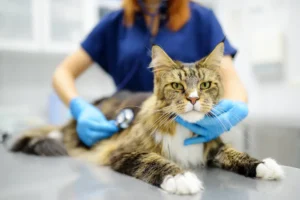If your cat is experiencing chronic vomiting, diarrhea, or weight loss, they might have more than just a sensitive stomach. These signs can point to inflammatory bowel disease in cats, also known as feline IBD. Understanding this condition can help you take the right steps toward managing it and giving your cat a better quality of life.
What Is Feline Inflammatory Bowel Disease?
Feline inflammatory bowel disease (IBD) is a chronic condition that occurs when a cat’s gastrointestinal (GI) tract becomes persistently inflamed. This inflammation interferes with the normal digestion and absorption of nutrients, which can lead to symptoms like vomiting, diarrhea, and weight loss. It’s important to note that IBD in cats is different from food sensitivities or occasional tummy troubles. This is a true medical condition that requires proper diagnosis and management.
IBS vs. IBD in Cats
While they sound similar, Inflammatory Bowel Disease (IBD) and Irritable Bowel Syndrome (IBS) are different conditions. IBD in cats is a chronic, inflammatory condition caused by an abnormal immune response in the gastrointestinal tract. It involves physical changes to the GI lining and often requires long-term medical treatment.
On the other hand, IBS in cats refers more to functional digestive issues that are often stress-related and don’t involve inflammation or tissue damage. IBS symptoms may come and go and are usually managed through lifestyle changes rather than medication.
Knowing the difference is important, because IBD requires a more comprehensive diagnostic approach and treatment plan.
What Causes Inflammatory Bowel Disease in Cats?
The exact cause of inflammatory bowel disease in cats isn’t fully understood, but most experts believe it stems from an abnormal immune response to everyday substances in the GI tract. Triggers may include certain food proteins, intestinal bacteria, or even parasites. In some cases, the body starts attacking its own gut lining, leading to chronic inflammation.
Genetics may also play a role, as some breeds (like Siamese cats) appear to be more prone to developing the condition. Environmental stress, changes in diet, or underlying allergies could also contribute. Over time, ongoing irritation and immune dysfunction may lead to the development of feline inflammatory bowel disease.
What Are the Clinical Signs of IBD?
IBD symptoms in cats can vary depending on which part of the digestive tract is affected. Common signs include:
- Chronic or recurring vomiting
- Diarrhea (often with mucus or blood)
- Weight loss
- Lethargy
- Poor coat quality
- Decreased appetite
These symptoms often appear gradually and may come and go, making them easy to overlook at first. But if your cat is showing signs regularly, it’s time to investigate further.
How Is IBD in Cats Diagnosed?
Diagnosing inflammatory bowel disease in cats involves ruling out other causes of GI issues, such as parasites like tapeworms, infections, or cancer. Your vet will typically perform a series of tests:
- Fecal tests to rule out parasites
FeLV/FIV testing, as these viruses can affect the immune system and predispose some cats to cancer - Bloodwork and urinalysis to assess overall health
- Abdominal ultrasound to evaluate GI tract inflammation
- Biopsy (via endoscopy or surgery) to confirm IBD and identify the type of inflammation
A clear diagnosis requires tissue samples showing inflammation in the intestinal wall.
How Is IBD in cats treated?
There is no one-size-fits-all approach to cat IBD treatment, and managing the condition often involves a combination of strategies. Your veterinarian will tailor a plan based on your cat’s symptoms, test results, and response to therapy.
Deworming
Even if no parasites are found, many vets start treatment with a broad-spectrum dewormer, just in case. Parasites can mimic or contribute to symptoms of IBD, so eliminating this possibility is an important first step.
Diet management
Dietary therapy plays a major role in managing IBD. Your vet may recommend:
- A hypoallergenic or novel protein diet
- Easily digestible or hydrolyzed protein formulas
- High-fiber diets, depending on symptoms
Some cats respond well to a prescription food trial, which can help determine if diet is a contributing factor.
B-vitamin supplementation
Many cats with IBD don’t absorb nutrients properly, leading to deficiencies. Supplementing with B12 (cobalamin) can improve appetite and energy levels and support gastrointestinal health.
Immunosuppressive mediations
When diet alone isn’t enough, medications that suppress the immune response may be necessary. These help reduce inflammation and allow the intestinal lining to heal. Commonly used medications include corticosteroids like prednisolone.
Do Corticosteroids Cause Side Effects in Cats?
Yes, corticosteroids can cause side effects, particularly with long-term use. These may include increased thirst and urination, increased appetite, and potential risks to liver function. However, for many cats, the benefits outweigh the risks, especially when monitored closely by your vet.
Does this Mean that I Will Be Giving Steroids to My Cat for the Rest of His Life?
Not necessarily. Some cats only need steroids during flare-ups or as part of an initial treatment plan. Over time, your vet may be able to taper the dose or explore alternative medications. The goal is always to use the lowest effective dose to manage symptoms.
Are Other Anti-Inflammatory Drugs Used to Treat Cat IBD?
Yes. If corticosteroids aren’t effective or cause issues, other drugs may be used, such as:
- Budesonide (a corticosteroid with fewer systemic effects)
- Chlorambucil (a chemotherapy drug used for immune suppression)
- Cyclosporine (an immune-modulating drug)
These are usually prescribed by a specialist or when standard treatments fail.
What is the Prognosis for Cat IBD?
The prognosis for cats with IBD varies. Some cats respond well to treatment and live comfortably for many years. Others may have more persistent symptoms or need frequent adjustments to their treatment plan. Early intervention, consistency, and close monitoring all help improve outcomes.
For more advanced or end-stage inflammatory bowel disease in cats, the prognosis can be more uncertain, and the focus shifts to maintaining comfort and quality of life.
When to See the Vet for Cat Diarrhea or Other Digestive Issues
Don’t wait if your cat is experiencing vomiting, diarrhea, or weight loss that lasts more than a few days. These signs could indicate something more serious than simple digestive upset, such as parasites, infections, or chronic conditions like IBD. Kittens, senior cats, or cats with existing health issues can become dehydrated quickly, so early care is especially important.
If your cat is sick, lethargic, hiding more than usual, refusing food, or showing signs of pain when touched, it’s best to contact a vet immediately. Getting your cat evaluated early may help prevent further complications and lead to faster relief.
Need Immediate Care? Find an UrgentVet Near You Today!
Whether your cat has been newly diagnosed or you’re trying to figure out the cause of chronic symptoms, understanding IBD in cats is the first step. From cat IBD treatment options to managing flare-ups, knowledge helps you advocate for your feline friend. If your pet is struggling with GI issues and you need help, UrgentVet is here to provide urgent veterinary services when your regular vet isn’t available.
If your cat needs help outside of regular vet hours, UrgentVet Pet Clinic provides compassionate, affordable care for non-life-threatening issues. Whether it’s chronic digestive problems, mild dehydration, or unexplained weight loss, our clinics make it easy to get an appointment with same-day care and after-hours availability.
Find your neighborhood UrgentVet location and get your cat the quality care they need to live a happy, healthy life.
FAQs About Cat IBD
If your cat has been diagnosed with IBD or is showing possible signs, you likely have a lot of questions. Here are answers to some of the most common ones:
Is IBD in cats painful?
IBD in cats can cause discomfort, especially during flare-ups. Pain management isn’t always required, but your vet may recommend options if needed.
How long does it take for prednisone to work in cats with IBD?
Many cats with IBD show improvement within 1 to 2 weeks of starting prednisone, but it can take longer for full results. Your vet will monitor progress and adjust the dose as needed.
What are the best foods for cats with IBD?
The best food for feline IBD depends on your cat’s individual response. Common choices include hydrolyzed protein diets, novel protein diets (like rabbit or venison), or prescription gastrointestinal formulas.
Is IBD common in cats?
Yes, inflammatory bowel disease is one of the most common causes of chronic vomiting and diarrhea in middle-aged and older cats.
Is IBD in cats curable?
No, IBD in cats is not curable, but it’s usually manageable. With the right combination of diet, medication, and follow-up care, many cats enjoy long and healthy lives.
What are the symptoms of end-stage IBD in cats?
Signs of end-stage inflammatory bowel disease in cats include severe weight loss, frequent vomiting or diarrhea, lack of appetite, and unresponsiveness to treatment.
How do you test for IBD in cats?
IBD is typically diagnosed in felines through a combination of bloodwork, imaging, and intestinal biopsy.
Can stress cause IBD flare-ups in cats?
Yes. Stress can trigger or worsen IBD symptoms in some cats. Keeping your cat’s environment calm and predictable can help reduce flare-ups.
Can probiotics help with IBD in cats?
In some cases, yes. Probiotics may help balance gut bacteria and reduce inflammation, but they should only be used under your vet’s guidance as part of a larger treatment plan.
Should I switch my cat’s diet if I suspect IBD?
No, not without talking to a veterinarian first, because abrupt diet changes can make symptoms worse. If your vet suspects diet plays a role, they can then recommend a specific food trial.
Image Credit: Maria Sbytova / Shutterstock
[/vc_column_text][/vc_column][/vc_row]






